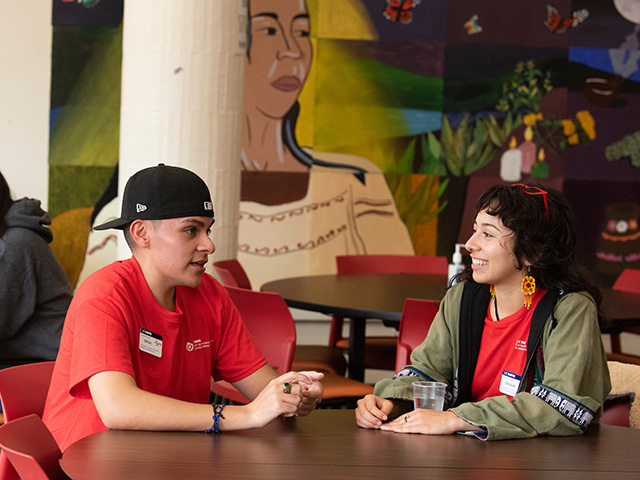
Multicultural Scholars Program to bring underrepresented students into plant sciences
Scholarships to support LatinX/ChicanoX youth
Quick Summary
- Daniel Potter, Allen van Deynze and Charles Brummer are participating in a 5-year program funded by NIFA to recruit underrepresented students into plant sciences.
When UC Davis recruiters visit high schools and community colleges, they have new reasons to encourage students who might not usually think of college. The Department of Plant Sciences Multicultural Scholars Program now offers financial support to California students from under-represented communities to help them pursue a career in the field.
Scholarship funds are now available for three incoming undergraduate students from California high schools and four more undergrads transferring in from the state’s community colleges. MSP scholars will receive interdisciplinary training, have opportunities to network with their peers and industry professionals, and participate in professional meetings.
“The disparity between the proportion of multicultural students in California high schools and those going to college is staggering. We hope to this program is only a beginning to address this,” said program lead Allen Van Deynze, director of the department’s Seed Biotechnology Center and associate director of the Plant Breeding Center
MSP is funded through a $250,000 grant awarded earlier this year by the National Institute of Food and Agriculture, a branch of the United States Department of Agriculture. It’s administered through the UC Davis Plant Breeding Center and led by Van Deynze. Department Chair Gail Taylor, plus faculty members Daniel Potter and Charlie Brummer, also are participating in the five-year project.
Goal: Bring more LatinX/ChicanX students into plant sciences

MSP especially seeks to recruit young men and women of LatinX/ChicanX origin. Non-white Spanish-speakers make up more than 40 percent of California’s population and 96 percent of the state’s agricultural workers, according to the U.S. Census Bureau. But at UC Davis, LatinX/ChicanX students comprised a little more than 24 percent of students campus-wide in 2021, according to the campus Office of Diversity, Equity and Inclusion. Their representation in plant sciences is even smaller.
The department’s new scholarship program is part of a larger, university-wide effort to recruit under-represented students into all educational levels. “As a public, land-grant institution, UC Davis has a responsibility to serve the citizens of the state of California,” the campus strategic vision for diversity states.
The campus has been striving to become a Hispanic-Serving Institution, a federally-designated institution of higher learning that has a full-time equivalent enrollment of undergraduate of at least 25 percent Spanish-speaking students. This designation enables institutions to apply for critical funding to support student success, innovation and institutional transformation.
How to apply to the Multicultural Scholars Program
Applicants to the Department of Plant Sciences Multicultural Scholars Program must be citizens or permanent residents of the United States of America. Prospective students first apply to UC Davis, marking on their application the preference for earning a bachelor’s degree in the Department of Plant Sciences.
After submitting the UC application, interested applicants should email Amanda Saichaie at asaichaie@ucdavis.edu and let her know they would like to be considered for an MSP scholarship.
All students take a common set of core courses and choose from one of seven areas of emphasis. MSP students also participate in internships with campus organizations or off-campus with local industries. The program leverages UC Davis educational and support programs with special experiential learning opportunities in academia and local industries. It also helps participants develop interpersonal and leadership skills.
The department prepares students who want to learn how plants grow, develop and function in agricultural ecosystems, urban environments and natural and managed wildlands, and how plant products are used for food, fiber and sustainable environmental improvements.
Related links
Read about efforts at UC Davis to become a Hispanic-Serving Institution.
Media Resources
- Trina Kleist, tkleist@ucdavis.edu, (530) 601-6846
